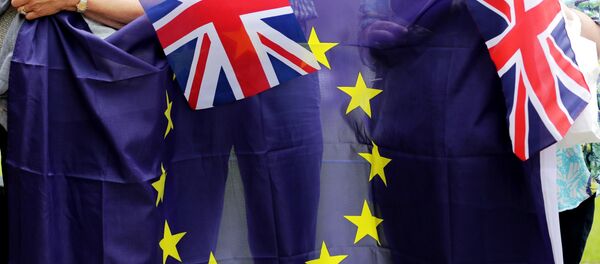Professor John Curtice, a political scientist who is currently Professor of Politics at the University of Strathclyde and Senior Research Fellow at NatCen Social, claims that Brits are not suffering from "buyer's remorse" over Brexit.
Professor Curtice said that polls indicate British people are happy with the decision they made and any talk of regret is simply untrue.
Do you regret how you voted in the EU referendum? https://t.co/gZ03tTbSxC
— David Jones (@DavidJo52951945) 21 September 2016
"There have been a couple of opinion polls since June 23, but we have had four opinion polls [in total]. Two of them were done in the immediate wake of the vote and those seem to suggest that more Leave voters had changed their mind. But subsequent to those, two more Leave polls have said its 50/50 and 51/49 for Leave, so a very similar result that was seen in the vote," Professor Curtice told Sputnik.
@GElsharief @lox747 @BritsfortheEU @NFUtweets sadly I think you're right Gail. Cryin shame, lots regret it. Let Parliament have a say I say pic.twitter.com/bsT6z3MwO0
— EU Elvis (@EUlvis) 22 September 2016
"Next is YouGov, they have been saying to people, do you think the UK decision to leave the EU is right or wrong? What we discovered was that it was 50/51 who think it's right. Pretty much everyone who voted Remain think we are making a mistake. But voters who wanted to Leave think it was a good decision."
So could the talk of regret amongst British voters be a rumor spread by the Remain camp, who obviously wanted to stay within the EU?
"The truth is that Remain voters do feel regret about the outcome, and they are reflecting that feeling among themselves, that this is an enormous mistake. They find it remarkable that the UK should collectively make that decision. But of course Remain voters tend to talk to Remain voters and therefore, are not aware that those who have made the decision to Leave don't necessarily share their views," Professor Curtice told Sputnik.
"There is a pretty big social division underlying the Brexit vote. Young university graduates think we should Remain, but they tend to talk to other young university graduates. It's older people who voted to Leave and they tend to talk to each other as well. So therefore, we shouldn't be surprised that the country as a whole doesn't necessarily share their views."
However, could regret seep in once Article 50 is invoked? Triggering this could mean that many voters who wanted to leave the EU are left red-faced if things do not go there way during negotiations with the EU.
A nation divided — from @PrivateEyeNews #Brexit #Bregret #Regrexit pic.twitter.com/XEpjGbsI3q
— Mikko Kuisma (@DrMKuisma) July 8, 2016
"There is no doubt that if you ask the Leave camp what they are hoping for and expecting from Brexit, it looks as though they would like to see some compromise between free trade and freedom of movement. There is hope and expectation that we will be able to limit immigration from the EU, but still have [access], at least, to the free market," Professor Curtice told Sputnik.
"Now of course, the 64,000 dollar question is whether the European Union will be able to play ball sufficiently that we might end up with some degree of compromise between those two objectives that might be acceptable to the EU and the UK government."
Professor Curtice believes that the UK has always been a reluctant member of the EU, who gave Britain lots of opt-outs and exceptions if they decided to stay. However, whether this kindness is transferred now that Brits have decided to leave, remains to be seen.
"Some Leave voters who were hoping that the consequences are not going to be too bad, may change their mind. So far, at least, the world has not fallen in. At least the economy has not suffered. Now that may not remain true, but if indeed at the end, the consequences are not as deleterious as the Remain side argued, maybe some Remain voters will change their mind," Professor Curtice told Sputnik.
Protesters @spikedonline in London calling on the government to invoke #Article50, initiating #Brexit pic.twitter.com/hAWG7wQeMx
— Sputnik UK (@SputnikNewsUK) September 5, 2016
"There is no doubt that the UK conservative government does face a difficult task. In the same way we was divided 50/50 as to whether we should stay in the EU or not and we was divided 50/50 about what we want out of those Brexit negotiations. Half of us think that its immigration and we stick to immigration as a priority and the other half say free trade," Professor Curtice told Sputnik.
"We #Bregret to inform you that "#Leave" always meant us."
— Steve Steinbach (@SteveSteinbach) July 5, 2016
— #Cameron, #Johnson, #Farage#TheBTeam pic.twitter.com/uq4vi26qOC
"What the UK government needs to satisfy Leave voters is that somewhere, somehow along the line the UK is able to say in at least some circumstances that immigration from the EU has to stop. It's the sense of control that seems to be crucial, the questions is whether or not achieving that in some way or another can be done while at the same time maintain access to free trade."



